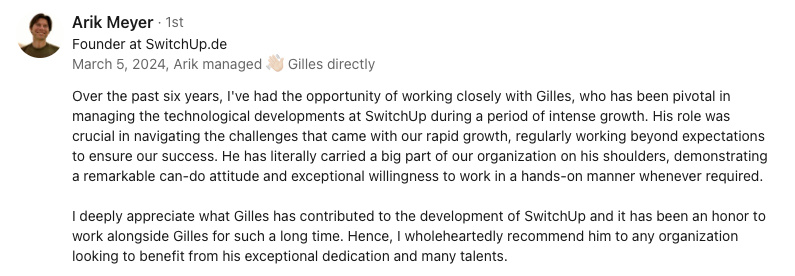Abstract:
In today's digital landscape, remote startups face significant security challenges, particularly concerning phishing attacks and insider breaches, which can severely impact their business operations and finances. The article addresses these issues by exploring the importance of adhering to European Union data protection regulations, such as GDPR, which not only fulfills legal obligations but also enhances customer trust and operational efficiency. To mitigate security risks, startups are encouraged to implement strategies like multi-factor authentication and regular security training, while also embracing innovative technologies such as zero-trust models, advanced encryption, and AI-driven threat detection to protect digital assets. The article emphasizes the cost-effectiveness of using cloud-based and open-source security tools, alongside best practices like role-based access control and regular audits, to maintain robust security without excessive spending. Highlighting success stories, it illustrates how a Berlin startup improved security through zero-trust models and AI tools, underscoring the benefits of aligning security measures with business goals and legal requirements. Ultimately, the article positions cybersecurity as both a challenge and an opportunity for remote startups, advocating for informed actions and smart solutions to ensure a secure and thriving business environment.
In the current digital landscape, remote startups encounter significant security challenges. Without direct supervision, they face threats like phishing and insider breaches that can jeopardize their business. This article examines these issues and explores how adhering to European Union data protection regulations can safeguard your startup. We'll address topics from phishing to EU compliance, providing practical tips and innovative technologies to enhance your startup's security. Whether you're a tech enthusiast or a startup leader, understanding these challenges and solutions is crucial for keeping your business secure and successful.
Understanding the Security Landscape
Remote startups confront numerous data security threats that can impact their business and finances. This section highlights these challenges and emphasizes the importance of adhering to EU data protection regulations. Additionally, leveraging remote work technologies like collaborative platforms and secure communication tools can enhance productivity and team cohesion.
Common Data Security Challenges
The Threat of Phishing and Insider Attacks
Remote startups, lacking direct oversight, are particularly susceptible to security threats such as phishing attacks and insider breaches. Phishing attacks have increased, especially with more employees working remotely, targeting those who might be less vigilant outside a traditional office environment. Insider threats have also risen, complicating the monitoring of employee actions remotely. Startups must implement robust security measures to address these challenges.
Financial and Operational Impacts of Security Breaches
Security breaches can financially devastate startups. Ransomware, in particular, poses a significant threat, with incidents doubling recently. Such attacks can halt a startup's operations and lead to substantial financial losses. As a result, startups are urgently seeking ways to protect their business and finances.
Mitigation Strategies for Startups
To mitigate these risks, startups can adopt strategies such as multi-factor authentication (MFA) and regular security training. MFA can prevent most account compromise attempts, while training helps reduce security incidents. These measures can significantly enhance a startup's security.
Importance of EU Data Protection Compliance
Relevance of EU Regulations for Remote Startups
For startups operating within the EU, adhering to data protection regulations like GDPR is both a legal obligation and a strategic advantage. GDPR emphasizes securing personal data, which is essential for startups handling sensitive information. Compliance with GDPR can build client trust and prevent legal complications.
Benefits and Penalties of GDPR Compliance
Adhering to EU regulations like GDPR offers benefits such as improved efficiency and increased customer trust. It demonstrates a commitment to data protection, distinguishing a startup from its competitors. Conversely, non-compliance can result in hefty fines, underscoring the importance of maintaining compliance. Startups can adopt data-driven strategies, such as using metrics to track compliance progress and identify areas for improvement.
Strategies for Ensuring Compliance
Startups should conduct regular audits and establish strong data protection policies to remain compliant with EU data protection regulations. Regular audits can identify vulnerabilities, while robust policies ensure that startups meet GDPR standards, safeguarding customer data.
Innovative Security Technologies
As remote startups expand, they must stay ahead of security threats. Advanced security technologies, such as zero-trust models, encryption, and AI-driven threat detection, can help protect digital assets.
Zero-trust Security Models
The zero-trust model operates on the principle of never trust, always verify. Unlike traditional methods, it continuously verifies access, regardless of the request's origin. This approach emphasizes detailed access control, making it ideal for remote work environments. Implementing zero-trust can streamline operations and enhance security.
Advanced Encryption Techniques
Emerging encryption technologies, such as quantum-resistant encryption and zero-knowledge proofs, are crucial for data security. These advancements protect data against future threats, ensuring robust data protection.
AI-driven Threat Detection
AI enhances threat detection by identifying unusual behavior. It enables rapid detection and response to potential threats. AI's predictive capabilities also allow startups to anticipate and address vulnerabilities, keeping them ahead of cybercriminals. This technology not only improves security but also boosts operational efficiency by automating threat detection processes.
Practical Security Strategies for Startups
Startups need effective security measures that are financially sustainable. Here are some cost-effective strategies to protect data while being budget-conscious:
Cloud-based Security: Utilizing cloud-based security can reduce costs. Cloud providers like AWS and Google Cloud offer built-in security features, eliminating the need for expensive on-site infrastructure and resulting in significant savings.
Open-source Security Tools: These tools provide robust protection against threats and offer flexibility for startups. They help manage costs while maintaining strong security.
Multi-factor Authentication (MFA): MFA adds an extra layer of security, and role-based access control (RBAC) restricts data access based on user roles, enhancing data security and streamlining operations.
Regular Audits and Employee Training: Conducting audits to identify vulnerabilities and providing training to reduce security incidents are crucial. These practices foster a culture of security awareness and proactive risk management.
Embracing New Frontiers in Remote Work Security
As remote work becomes more prevalent, understanding new security trends is essential for protecting digital assets.
Emerging Security Trends
The zero-trust architecture is transforming how startups manage security in remote environments. It requires verification at every step, ensuring continuous trust validation. Implementing this framework reduces security risks.
There's also a rise in phishing and social engineering attacks. Startups must remain vigilant, employing security training and advanced threat intelligence to combat these threats.
Collaboration with Security Firms
Partnering with security firms is vital for navigating cybersecurity challenges. These collaborations provide startups with access to advanced technology and expertise. Successful partnerships can offer a strategic advantage, enhancing security capabilities without incurring the full cost of development.
Success Stories in Security Implementation
Success Stories of Implementing Security Measures
A startup in Berlin adopted a zero-trust model, resulting in a significant improvement in security. They implemented robust identity and access management, reducing unauthorized access attempts. This approach not only bolstered security but also increased operational efficiency.
Another startup utilized AI-driven tools to enhance security. By integrating real-time anomaly detection, they quickly identified and neutralized potential threats. This proactive strategy significantly strengthened their security framework.
Lessons Learned from Startup Security
These examples illustrate key lessons for startups. Understanding security challenges and taking proactive measures are crucial for protecting digital assets. Aligning security with business goals and legal requirements ensures sustainable growth. Embracing new technologies like AI and encryption helps startups stay ahead of threats, fostering a culture of learning and innovation. Personal experiences from these startups underscore the importance of adapting to evolving security landscapes.
In the world of remote startups, cybersecurity presents both challenges and opportunities. This article has shared strategies like zero-trust security models, advanced encryption, and AI for threat detection. These tools protect your assets and align with EU data protection regulations, offering a competitive advantage and building customer trust. Employing cost-effective solutions ensures robust security without overspending. Consider how these strategies can be tailored to your startup's needs as you navigate security challenges. Your journey to a secure and thriving startup begins with informed actions and smart solutions.
You might be interested by these articles:
- Navigating the New Era of Remote Work Tech
- What do you do if your virtual team's communication is falling apart?
- Revolutionizing Work with Remote Technologies





